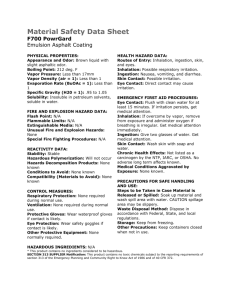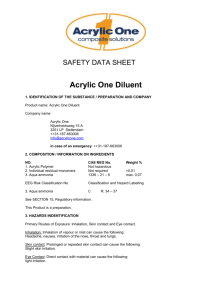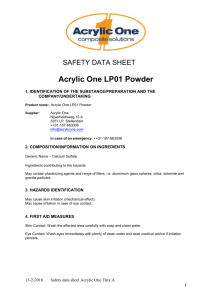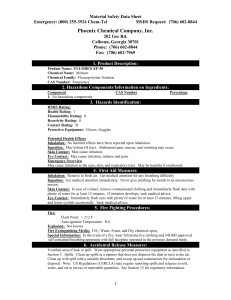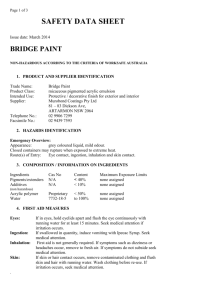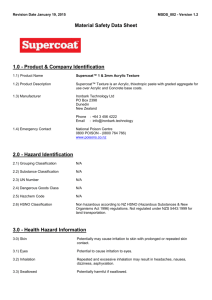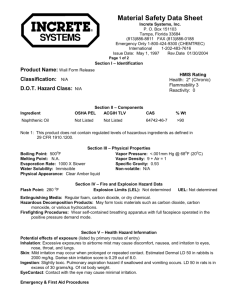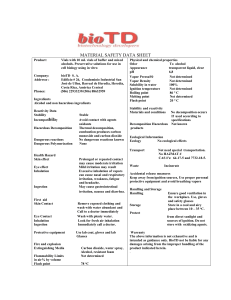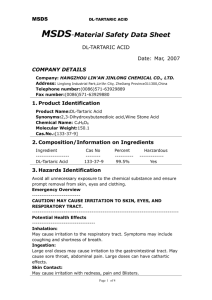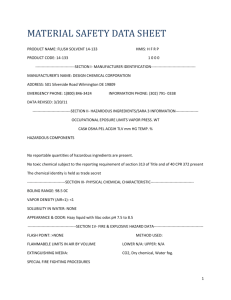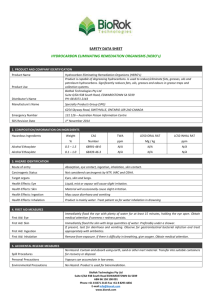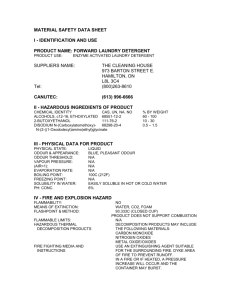Material one - Materialshop.fi
advertisement
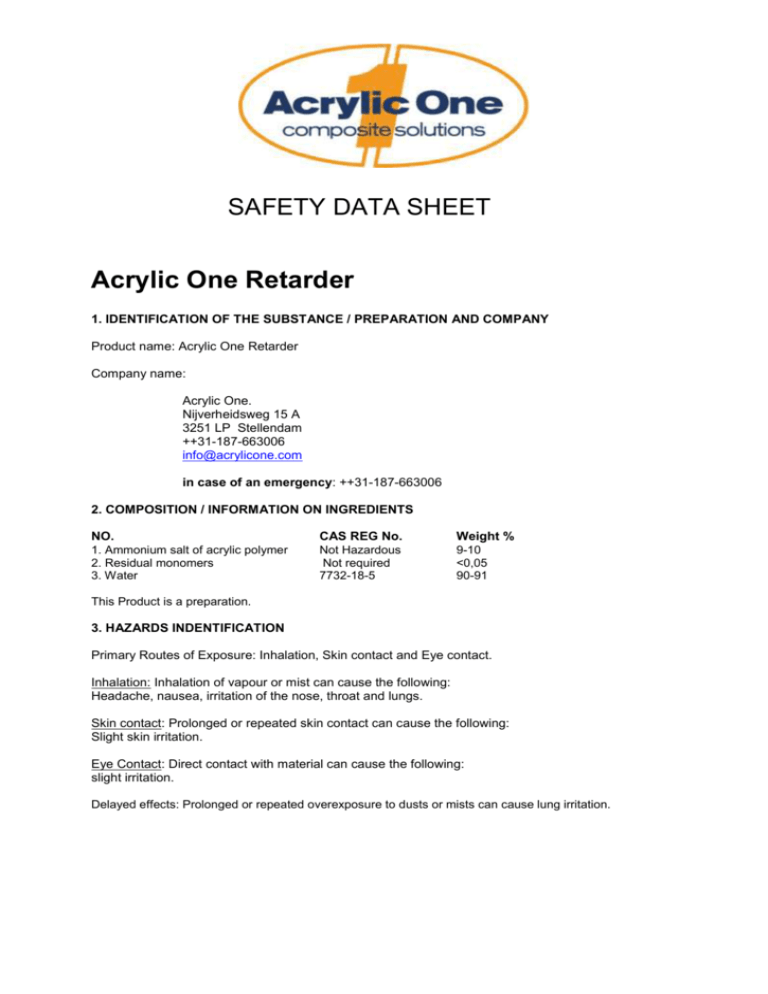
SAFETY DATA SHEET Acrylic One Retarder 1. IDENTIFICATION OF THE SUBSTANCE / PREPARATION AND COMPANY Product name: Acrylic One Retarder Company name: Acrylic One. Nijverheidsweg 15 A 3251 LP Stellendam ++31-187-663006 info@acrylicone.com in case of an emergency: ++31-187-663006 2. COMPOSITION / INFORMATION ON INGREDIENTS NO. 1. Ammonium salt of acrylic polymer 2. Residual monomers 3. Water CAS REG No. Not Hazardous Not required 7732-18-5 Weight % 9-10 <0,05 90-91 This Product is a preparation. 3. HAZARDS INDENTIFICATION Primary Routes of Exposure: Inhalation, Skin contact and Eye contact. Inhalation: Inhalation of vapour or mist can cause the following: Headache, nausea, irritation of the nose, throat and lungs. Skin contact: Prolonged or repeated skin contact can cause the following: Slight skin irritation. Eye Contact: Direct contact with material can cause the following: slight irritation. Delayed effects: Prolonged or repeated overexposure to dusts or mists can cause lung irritation. 4. FIRST AID MEASURES Inhalation: Move subject to fresh air. Skin Contact: Wash affected skin areas thoroughly with soap and water consult a physician if irritation persists. Eye Contact: Flush eyes with a large amount of water for at least 15 minutes. Consult a doctor if irritation persists. Ingestion: If swallowed, give 2 glasses of water to drink. Consult a doctor. Never give anything by mouth to an unconscious person. 5. FIRE-FIGHTING MEASURES Flash Point: Auto-ignition Temperatures Lower Explosive Limit Upper Explosive Limit Non-combustible Not applicable Not applicable Not applicable Unusual Hazards: Material can splatter above 100 ºC. Dried product can burn. Extinguishing Agents: Use extinguishing media appropriate for surrounding fire Personal Protective Equipment: Wear self contained breathing apparatus and full protective gear. 6. ACCIDENTAL RELEASE MEASURES Personal Protection: Appropriate protective equipment must be worn. When handling a spill of this material. See SECTION 8, exposure Controls / Personal Protection for recommendations. If exposed to material during clean up operations, see Section 4, First Aid Measures, for actions to follow. Procedure: Keep spectators away. Floor may be slippery; use care to avoid falling. Contain spills immediately with inert materials (e.g. sand, earth). Transfer liquids and solid dyking material to separate suitable containers for recovery or disposal. Caution: Keep spills and cleaning runoff out of municipal sewers and open bodies of water. 7. STORAGE AND HANDLING Storage Conditions: Keep from freezing: material may coagulate. Minimum recommended storage temperature for this material is 1 ºC. Maximum recommended storage temperature for this material is 49 ºC Handling Procedures: Monomer vapours can be evolved when material is heated during processing operations. Note: Formaldehyde will be generated under acidic conditions. Maintain adequate ventilation under these conditions to prevent exposure to formaldehyde above the recommended ceiling of 0.3 ppm. 8. EXPOSURE CONTROLS / PERSONAL PROTECTION No. CAS REG NO Weight % 1. Ammonium salt of acrylic polymer Not Hazardous 9-10 2. Residual monomers Not required < 0.05 3. Water 7732-18-5 90-91 Respiratory protection: a respiratory protection program must be followed whenever workplace conditions warrant a respirator’s use. None required if airborne concentrations are maintained below the exposure limit. For dust or mist up to 5 times the exposure limit, wear a properly fitted approved filtering facepiece. If oil mist is present, wear a single use filtering facepiece. Eye protection: Use approved safety glasses with side shields. Eye protection worn must be compatible with respiratory protection system employed. Hand protection: Neoprene gloves may provide protection against permeation. Engineering controls (ventilation): Use local exhaust ventilation with a minimum capture velocity of 0.75 m/sec. at the point of dust or mist evolution. Other protective equipment: Facilities storing or utilizing this material should be equipped with an eyewash facility. 9. PHYSICAL AND CHEMICAL PROPERTIES Colour : Appearance : State : pH : Specific Gravity : Vapour Density : Vapour Pressure : Melting point : Boiling point : Solubility in water : Percent Volatility : Evaporation rate : Light yellow Clear Liquid 6–7 1.10 – 1.25 < 1 water 17 mm Hg 20 ºC water 0 ºC water 100 ºC water Completely soluble 90 to 91 % water < 1 water Physical and chemical date given are typical values for this product and are not intended to be product specifications. 10. STABILITY AND REACTIVITY Instability: This material is considered stable. However, avoid temperatures above 230 ºC, the onset of polymer decomposition. Thermal decomposition is dependant on time and temperature. Hazardous Decomposition Products: Thermal decomposition may yield acrylic monomers. Hazardous Polymerisation: Product will not undergo polymerisation. Incompatibility: There are no known materials which are incompatible with this product.Instability 11. TOXICOLOGICAL INFORMATION Toxicity data for a compositionally similar material: Oral LD50 – rat Dermal LD50 – rabbit Skin Irritation – rabbit: Eye Irritation – rabbit: 12. EXOLOGICAL INFORMATION No applicable Data >5000 mg/kg >5000 mg/kg Practically non-irritating Inconsequential Irritation 13. DISPOSAL CONSIDERATIONS. Procedure: For disposal incinerate this material at a facility that complies with local state and federal regulations for handling reactive material. 14. TRANSPORT INFORMATION Hazardous class : Not Regulated for Transport 15. REGULATORY INFORMATION EEG This product satisfies all the requirements of the European inventory of Existing Chemical Substances (EINECS) Hazardous class : Not Regulated for Transport 16. OTHER INFORMATION None DISCLAIMER OF LIABILITY The information in this MSDS was obtained from sources we believe are reliable. However, this information is provided without any warranty, express or implied, regarding its correctness. The conditions or methods of handling, storage, use or disposal of the product are beyond our control and maybe beyond our knowledge. For this and other reasons, we do not assume responsibility and expressly disclaim liability for loss, damage or expense arising out of or in any way connected with the handling, storage, use or disposal of the product. This MSDS was prepared and is to be used only for this product. If the product is used as a component in another product, this MSDS may not be acceptable.
